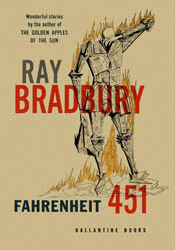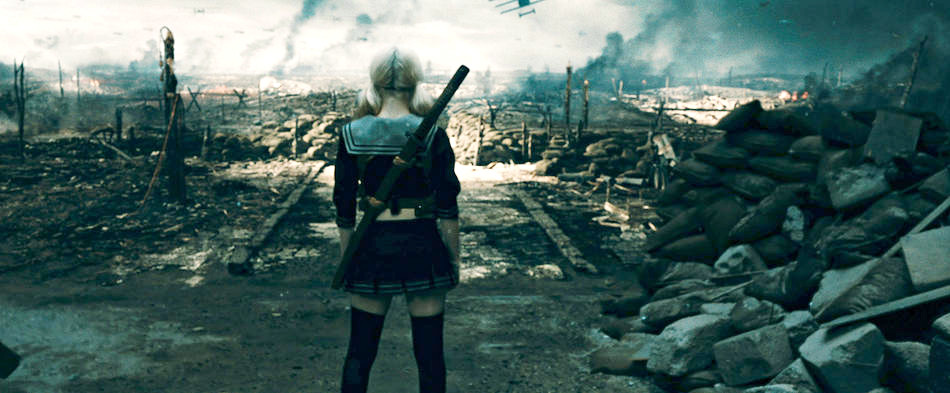I'll now explain dystopia, one of my favorite types of sci-fi. But first, some definitions according to Merriam-Webster. Media examples will be shown as well.
UTOPIA:
- An imaginary and indefinitely remote place
- A place of ideal perfection especially in laws, government, and social conditions
- An impractical scheme for social improvement
Some synonyms listed: Camelot, Eden, heaven, and never-never land.
An antinomy: hell
DYSTOPIA:
An imaginary place where people lead dehumanized and often fearful lives
I like to think of dystopia as a failed attempt at or a false appearance of a utopia. The society is usually oppressed by rules meant for good and safety such as isolation. Theses rules can be lies for control or actually intended to help mankind. Either way, a part of humanity is oppressed or sacrificed. There's usually social or political commentary as well.Technology is usually a method of control while nature is distanced from society.
Dystopia interests me for the philosophy and psychology of what is essential for a humane society to exist. Also, I'm intrigued by a single factor affecting society in various aspects. Compare a social change in a dsytopia to a change in the past in time travel sci-fii. A single action can build up to a new lifestyle.
If you want more definitions or characteristics, I found this site on George Orwell, author of
Nineteen Eighty-Four and Animal Farm.
Now for some media examples.
Nineteen Eighty-Four by George Orwell
| 1984 screen adaptation |
It's not a fast read though; I've been reading it little by little to appreciate the author's depicted system. "Big brother is watching you."
We by Yevgeny Zamyatin
In this one, society's schedule is measure from when you wake up to when you sleep. Calling in sick for work means you let you down society (irrational behavior). The collective over individual is a main focus. There's mathematical metaphors and descriptions of working with rhythm like in a mechanical ballet. Surgery on the brain is considered as a way of being rational.
Fahrenheit 451 by Ray Bradbury
This dystopia deals more with literature being essential to humanity and society than politics or government. With fireproof houses, firemen are given a new duty. They investigate homes suspected to hold literature and burn the books. Fahrenheit 451 is actually one of my favorite novels. It has that one factor changing different aspects of society, including television, teens, and conversation.
At the SD Comic Con, Bradbury stated that he wrote the book in response to his books being pulled off the shelves of high school libraries. However, he also states on the pamphlet for the stage adaptation that the story is NOT all about censorship. So remember to look at literature as a part of society and soul.
At the SD Comic Con, Bradbury stated that he wrote the book in response to his books being pulled off the shelves of high school libraries. However, he also states on the pamphlet for the stage adaptation that the story is NOT all about censorship. So remember to look at literature as a part of society and soul.
Uglies series by Scott Westerfield
I have not read this series, but here is a dystopia geared towards female readers. Society is convinced that a modified face (surgery) is beauty while natural features are ugly and primitive. Surgery is typically done during puberty, but unknown to everyone is that a part of the brain is modified as well. The titles list class ranks, with uglies being the lowest rank when a person has not had surgery yet. The book Extras follows a different heroine.
Equilibrium
Emotions are seen as the cause for war so everyone has to sedate themselves. In addition, all forms of art (literature, fine art, music, etc) is shunned because they are stimulating and provoking. There is a squad trained in martial arts with guns, which leads to flashy fight scenes. Christian Bale's character accidentally misses a dose one day and experiences emotion.
No novels were adapted for this film but they must have been an influence or inspiration. I think in the Special Features, the director states he hadn't read Brave New World yet (neither have I).
I have not read The Hunger Games but it is on my list. Have you read this one?
Overall, there's a lot of brainwashing and brain surgery going on in these dystopias. I did not describe the main character in every example, but most of them have a rank with power or an occupation that contributes to controlling society. I suppose the struggle for control is another feature I like in a dystopia as well. The dilemma is safety and control or humanity and freedom in these societies.








